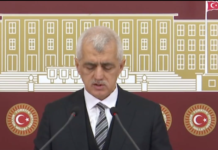Aslıhan Gençay, a former columnist for the Bianet and Siyasi Haber news websites, was disciplined for objecting to an unlawful strip search in central Turkey’s Sivas open prison, Turkish media reported.
Gençay was transferred to the open prison before her release on parole, which was expected to be granted in two days. She was subjected to a strip search before she was admitted to the facility. In an interview with the Duvar news website her lawyer Tugay Bek said because she objected to the search, Gençay was now in solitary confinement and could be denied parole by the parole board.
Prisoners who have earned the right to parole are transferred to open prisons in Turkey. According to Bek, Gençay was thoroughly searched before she left her previous high-security prison in nearby Kayseri and was tested for COVID-19. Her belongings were searched in the Sivas open prison, and Gençay took off her coat and sweater for a pat down.
Bek claimed she was ordered to fully undress and squat three times. Gençay later found out that all the inmates were put through this procedure. Bek said this was unusual because the inmates in that prison were there for a very short period of time until they were granted parole.
Gençay was first arrested in 1992 for alleged membership in a terrorist organization and was sentenced to 30 years in prison. She went on a hunger strike in the early 2000s, and her prison sentence was delayed because the European Court of Human Rights ruled she was in no condition to stay in prison. In 2016 she was arrested again on grounds that she still had time to serve for her initial arrest.
Bek said Gençay questioned why she was made to undress because this was not a regular procedure even in high-security prisons. Prison authorities took this as a threat, according to Bek, and wrote an official report accusing her “insult,” “threat,” “resisting authority” and “preventing prison guards from doing their job.” He said they found out the next day that she was under investigation.
Bek said the report was written in a way that made it seem as if Gençay had resisted the complete search of her belongings and body. However, she only resisted the strip search, which can only be conducted in specific circumstances.
Bek said Gençay was in and out of prison for the last 14 years and was accustomed to prison regulations. “It is unthinkable that she would jeopardize her parole for no good reason.” He claimed the prison administration was distorting facts to prevent Gençay from being paroled.
According to Turkish legal and preventative search regulations, strip searches can only be conducted in exceptional cases, such as when there are credible indications that the person has contraband materials on him. In such cases, the search must be conducted in a manner so as not to humiliate the person and as quickly as possible. When there is a credible suspicion that something is hidden in the person’s body, officers are required to ask the person to remove it himself and inform him that if he disobeys, the removal will be done by the prison doctor.
However, the testimony of an increasing number of women detained on terrorism charges shows that Turkish security forces use strip searches unlawfully and systematically to humiliate them.
According to Bek, strip searches have been used as a tool by prisons to break the will of the prisoner, especially if they have been imprisoned for terrorism. “Female inmates feel too humiliated to share this with anyone, even their families and lawyers. They do not even think they have the right to resist, and if they do they are punished like Aslıhan Gençay,” Bek said.
Bek said there were no security cameras when the search was conducted so it was the word of the inmate against the word of the guards. “The guards know this, of course, they write these reports knowing there will not be a follow-up. The court will decide on the parole based on these reports.”
The European Court of Human Rights has found strip searches to constitute degrading treatment when not justified by compelling security reasons and/or due to the way they were conducted.
But the practice has been frequently used by Turkish security forces against people suspected or convicted of political crimes. In August it was reported that Eylem Oyunlu, who was detained with her 10-day-old baby on the charge of aiding a terrorist organization, was strip searched in the southeastern city of Diyarbakır. Back in May 2018 Pınar Aydınlar, a famous folk singer and party council member of the pro-Kurdish Peoples’ Democratic Party (HDP), was beaten by guards at İstanbul’s Bakırköy Prison for Women after refusing a strip search.
Some of the women said the officers conducting the search were laughing as they were undressing. Human rights defender and HDP deputy Ömer Faruk Gergerlioğlu says strip searches are indeed conducted to humiliate the detainees.















[…] she was pregnant. The accounts of an increasing number of women detained on terrorism charges show that Turkish law enforcement officers use strip searches unlawfully and systematically to […]
[…] she was pregnant. The accounts of an increasing number of women detained on terrorism charges show that Turkish law enforcement officers use strip searches unlawfully and systematically to […]